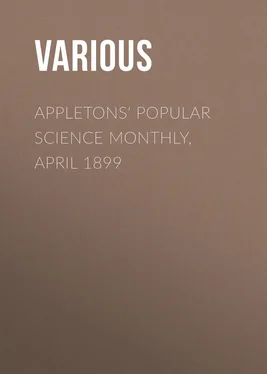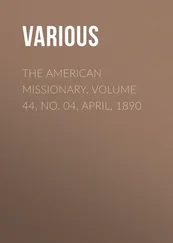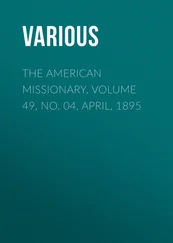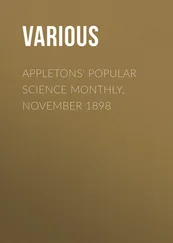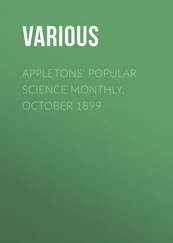Various - Appletons' Popular Science Monthly, April 1899
Здесь есть возможность читать онлайн «Various - Appletons' Popular Science Monthly, April 1899» — ознакомительный отрывок электронной книги совершенно бесплатно, а после прочтения отрывка купить полную версию. В некоторых случаях можно слушать аудио, скачать через торрент в формате fb2 и присутствует краткое содержание. Издательство: Иностранный паблик, Жанр: periodic, foreign_edu, на английском языке. Описание произведения, (предисловие) а так же отзывы посетителей доступны на портале библиотеки ЛибКат.
- Название:Appletons' Popular Science Monthly, April 1899
- Автор:
- Издательство:Иностранный паблик
- Жанр:
- Год:неизвестен
- ISBN:нет данных
- Рейтинг книги:5 / 5. Голосов: 1
-
Избранное:Добавить в избранное
- Отзывы:
-
Ваша оценка:
- 100
- 1
- 2
- 3
- 4
- 5
Appletons' Popular Science Monthly, April 1899: краткое содержание, описание и аннотация
Предлагаем к чтению аннотацию, описание, краткое содержание или предисловие (зависит от того, что написал сам автор книги «Appletons' Popular Science Monthly, April 1899»). Если вы не нашли необходимую информацию о книге — напишите в комментариях, мы постараемся отыскать её.
Appletons' Popular Science Monthly, April 1899 — читать онлайн ознакомительный отрывок
Ниже представлен текст книги, разбитый по страницам. Система сохранения места последней прочитанной страницы, позволяет с удобством читать онлайн бесплатно книгу «Appletons' Popular Science Monthly, April 1899», без необходимости каждый раз заново искать на чём Вы остановились. Поставьте закладку, и сможете в любой момент перейти на страницу, на которой закончили чтение.
Интервал:
Закладка:
While dreams are thus often formed by the molding together of more or less congruous images by a feeble but still intelligent sleeping activity, another factor is to be found in the involuntary wavering and perpetually mere meaningless change of dream imagery. Such concentration as is possible during sleep always reveals a shifting, oscillating, uncertain movement of the vision before us. We are, as it were, reading a sign-post in the dusk, or making guesses at the names of the stations as our express train flashes by the painted letters. Any one who has ever been subject to the hypnagogic imagery sometimes seen in the half-waking state, or who has ever taken mescal, knows that it is absolutely impossible to fix an image. It is this factor in dreams which causes them so often to baffle our analysis. In addition to the mere, as it were, mechanical flowing together of images and ideas, and the more or less intelligent molding of them into a whole, there is thus a failure of sleeping attention to fix definitely the final result – a failure which itself may evidently serve to carry on the dream process by suggesting new images and combinations. I dreamed once that I was with a doctor in his surgery, and saw in his hand a note from a patient saying that doctors were fools and did him no good, but he had lately taken some selvdrolla , recommended by a friend, and it had done him more good than anything, so please send him some more. I saw the note clearly, not, indeed, being conscious of reading it word by word, but only of its meaning as I looked at it; the one word I actually seemed to see, letter by letter, was the name of the drug, and that changed and fluctuated beneath my vision as I gazed at it, the final impression being selvdrolla . The doctor took from a shelf a bottle containing a bright yellow oleaginous fluid, and poured a little out, remarking that it had lately come into favor, especially in uric-acid disorders, but was extremely expensive. I expressed my surprise, having never before heard of it. Then, again to my surprise, he poured rather copiously from the bottle on to a plate of food, saying, in explanation, that it was pleasant to take and not dangerous. This was a vivid morning dream, and on awakening I had no difficulty in detecting the source of its various minor details, especially a note received on the previous evening and containing a dubious figure, the precise nature of which I had used my pocket lens to determine. But what was selvdrolla , the most vivid element of the dream? I sought vainly among my recent memories, and had almost renounced the search when I recalled a large bottle of salad oil seen on the supper table the previous evening; not, indeed, resembling the dream bottle, but containing a precisely similar fluid. Selvdrolla was evidently a corruption of "salad oil." I select this dream to illustrate the uncertainty of dream consciousness, because it also illustrates at the same time the element of certainty in dream subconsciousness . Throughout my dream I remained, consciously, in entire ignorance as to the real nature of selvdrolla , yet a latent element in consciousness was all the time presenting it to me in ever-clearer imagery.
While the confusions of dreaming are usually the union of unconnected streams of imagery which have, as it were, come from widely remote parts of the memory system to strike together at the narrow focus of shaping consciousness, in some rarer cases the fused images are really suggested by analogy and are not accidental. Maury records successions of dream imagery strung together by verbal resemblances; I have found such dreams rare, but other forms of association fairly common. Thus I once dreamed that I was with a dentist who was about to extract a tooth from a patient. Before applying the forceps he remarked to me (at the same time setting fire to a perfumed cloth at the end of something like a broomstick in order to dissipate the unpleasant odor) that it was the largest tooth he had ever seen. When extracted I found that it was indeed enormous, in the shape of a caldron, with walls an inch thick. Taking from my pocket a tape measure (such as I always carry in waking life) I founds the diameter to be not less than twenty-five inches; the interior was like roughly hewn rock, and there were sea-weeds and lichenlike growths within. The size of the tooth seemed to me large, but not extraordinarily so. It is well known that pain in the teeth, or the dentist's manipulations, cause those organs to seem of extravagant extent; in dreams this tendency rules unchecked; thus a friend once dreamed that mice were playing about in a cavity in her tooth. But for the dream first quoted there was no known dental origin; it arose solely or chiefly from a walk during the previous afternoon among the rocks of the Cornish coast at low tide, and the fantastic analogy, which had not occurred to waking consciousness, suggested itself during sleep.
The following dream illustrates an association of quite a different order: I imagined I was sitting at a window, at the top of a house, writing. As I looked up from my table I saw, with all the emotions naturally accompanying such a sight, a woman in her night dress appear at a lofty window some distance off and throw herself down. I went on writing, however, and found that in the course of my literary employment – I am not clear as to its precise nature – the very next thing I had to do was to describe exactly such a scene as I had just witnessed. I was extremely puzzled at such an extraordinary coincidence: it seemed to me wholly inexplicable. Such dreams, reduplicating the imagery in a new sensory medium, are fairly common, with me at all events, though I can not easily explain them. The association is not so much of analogy as of sensory media, in this case the visual image becoming a verbal motor image. In other cases a scene is first seen as in reality, and then in a picture. It is interesting to observe the profound astonishment with which sleeping consciousness apperceives such simple reduplication.
It sometimes happens that the confused imagery of dreams includes elements drawn from forgotten memories – that is to say, that sleeping consciousness can draw on faint impressions of the past which waking consciousness is unable to reach. This is a very important type of dream because of its bearing on the explanation of certain dream phenomena which we are sometimes asked to bow down before as supernatural. I may illustrate what I mean by the following very instructive case. I woke up recalling the chief items of a rather vivid dream: I had imagined myself in a large old house, where the furniture, though of good quality, was ancient, and the chairs threatened to give way as one sat on them. The place belonged to one Sir Peter Bryan, a hale old gentleman who was accompanied by his son and grandson. There was a question of my buying the place from him, and I was very complimentary to the old gentleman's appearance of youthfulness, absurdly affecting not to know which was the grandfather and which the grandson. On awaking I said to myself that here was a purely imaginative dream, quite unsuggested by any definite experiences. But when I began to recall the trifling incidents of the previous day I realized that that was far from being the case. So far from the dream having been a pure effort of imagination I found that every minute item could be traced to some separate source. The name of Sir Peter Bryan alone completely baffled me; I could not even recall that I had at that time ever heard of any one called Bryan. I abandoned the search and made my notes of the dream and its sources. I had scarcely done so when I chanced to take up a volume of biographies which I had glanced through carelessly the day before. I found that it contained, among others, the lives of Lord Peter borough and George Bryan Brummel. I had certainly seen those names the day before; yet before I took up the book once again it would have been impossible for me to recall the exact name of Beau Brummel, and I should have been inclined to say that I had never even heard the name of Bryan. I repeat that I regard this as, psychologically, a most instructive dream. It rarely happens (though I could give one or two more examples from the experience of friends) that we can so clearly and definitely demonstrate the presence of a forgotten memory in a dream; in the case of old memories it is usually impossible. It so happened that the forgotten memory which in this case re-emerged to sleeping consciousness was a fact of no consequence to myself or any one else. But if it had been the whereabouts of a lost deed or a large sum of money, and I had been able to declare, as in this case, that the impression received in my dream had never to my knowledge existed in waking consciousness, and yet were to declare my faith that the dream probably had a simple and natural explanation, on every hand I should be sarcastically told that there is no credulity to match the credulity of the skeptic.
Читать дальшеИнтервал:
Закладка:
Похожие книги на «Appletons' Popular Science Monthly, April 1899»
Представляем Вашему вниманию похожие книги на «Appletons' Popular Science Monthly, April 1899» списком для выбора. Мы отобрали схожую по названию и смыслу литературу в надежде предоставить читателям больше вариантов отыскать новые, интересные, ещё непрочитанные произведения.
Обсуждение, отзывы о книге «Appletons' Popular Science Monthly, April 1899» и просто собственные мнения читателей. Оставьте ваши комментарии, напишите, что Вы думаете о произведении, его смысле или главных героях. Укажите что конкретно понравилось, а что нет, и почему Вы так считаете.
